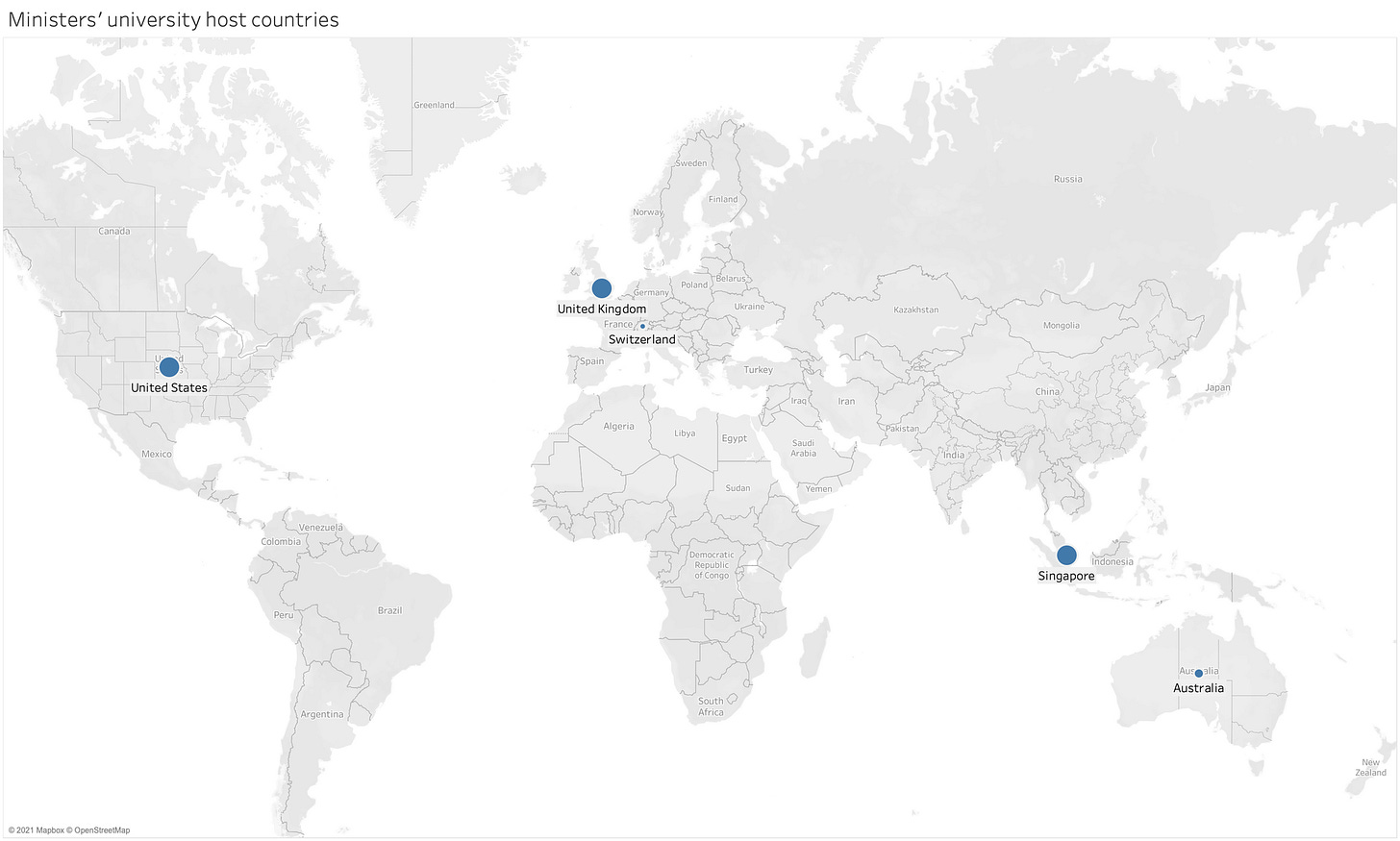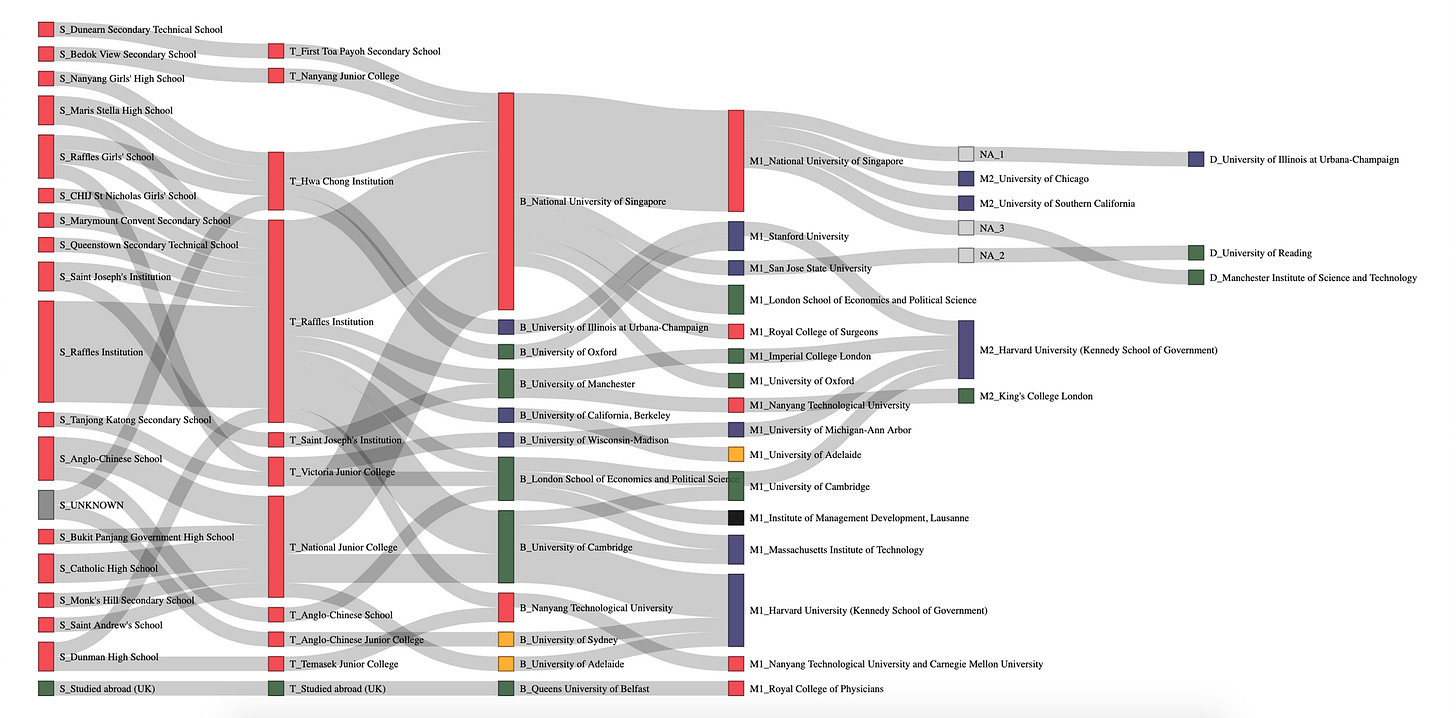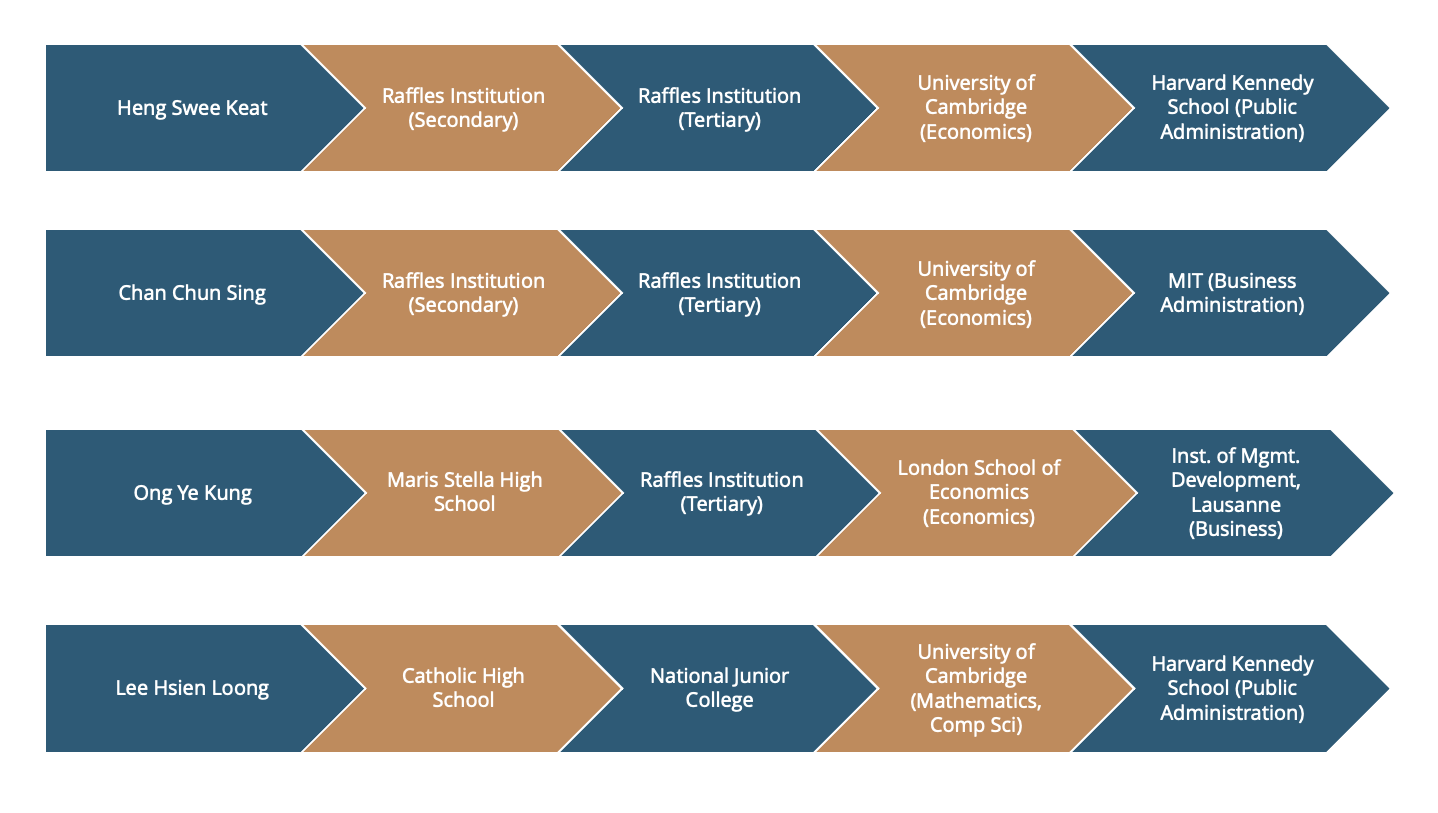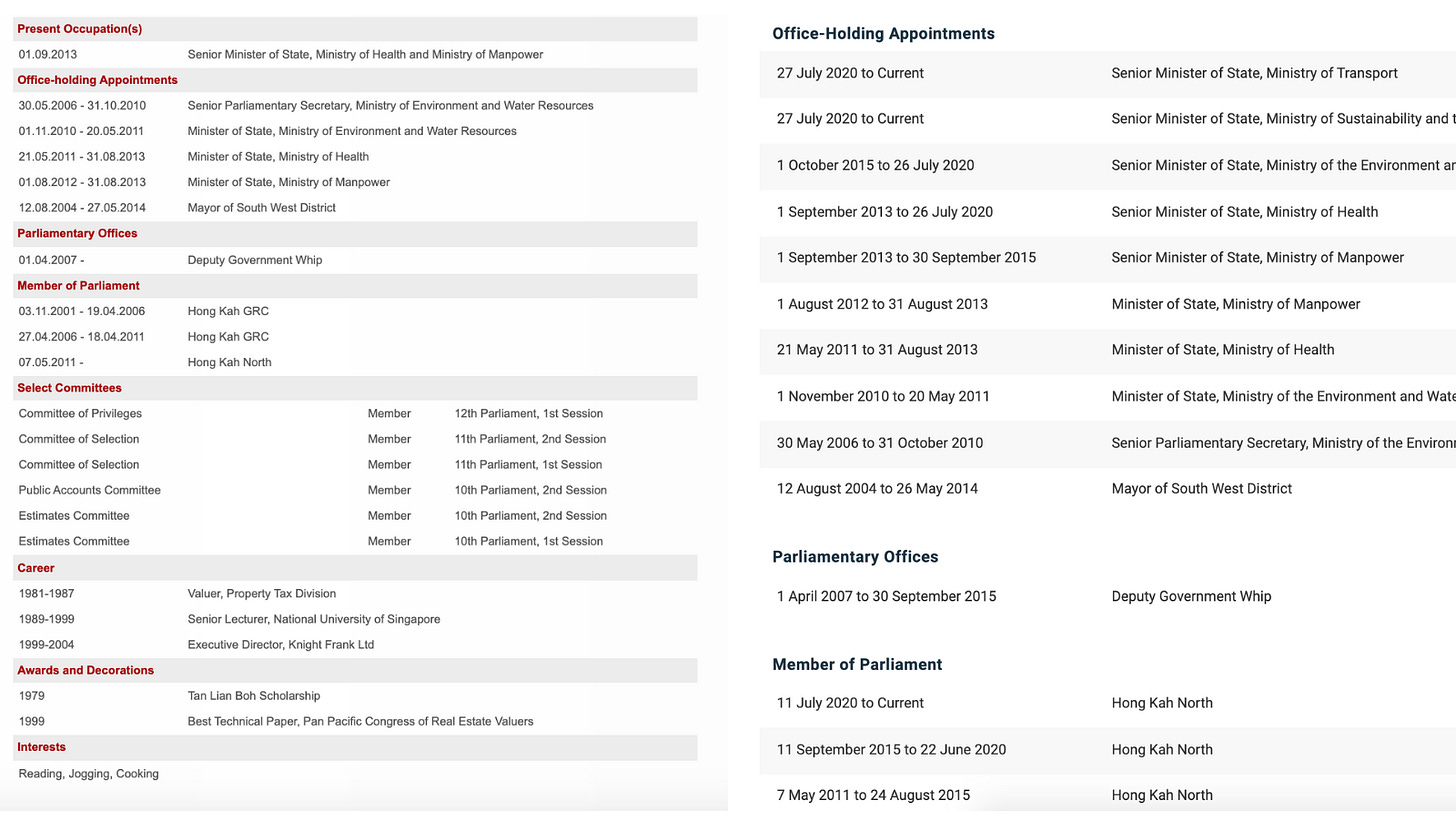 |
The majority of ministers (24 out of 34) studied at one of three tertiary institutions: Raffles Institution, National Junior College or Hwa Chong Institution. Despite attempts to shed the image of being an 'elite school', Singapore's oldest school (Raffles) remains the school of choice among Singapore's leaders.
For more stories on Singapore's internet, press and government, subscribe to receive email updates with each new issue's release.
|
 |
Singapore's Fixation with Oxbridge
Ministers’ most commonly attended universities are the National University of Singapore, Harvard University and the University of Cambridge.
In line with Singapore's national fixation with Oxbridge and the Ivy League, 13 out of 34 ministers have studied at these universities. However, this number falls to 8 when we exclude postgraduate studies at the Harvard Kennedy School — which has drawn some controversy over its admission requirements and graduates.
This figure (about 38% of Singapore ministers have studied at Oxbridge or the Ivy League) is not far from that of British politicians: In 2019, 57% of the British Cabinet and 36% of Junior Ministers studied at Oxford or Cambridge. What is striking however is our attainment of a similar figure despite being a continent away from the US and the UK.
|
 |
Running Singapore like a Business  Note: many ministers studied multiple degree subjects.The three most common degree subjects are economics, business and public policy / administration. All public policy / administration degrees were conferred by the Harvard Kennedy School. Notably, no minister has a university-level degree focusing on the humanities. The closest is Senior Minister of State Sim Ann’s Bachelor’s Degree in Philosophy, Politics and Economics. To be clear, the marginalisation of the humanities is not unique to Singapore, with the humanities suffering from shrinking sources of funding and decreased attendance worldwide. In the US, the percentage of all new graduates with a bachelor’s degree in the humanities was 11.9% in 2015, the lowest percentage ever recorded. In Singapore, 17.9% of new graduates who completed their bachelor’s degree in 2020 did so in the humanities or social sciences (as data specific to the humanities is not available, the actual percentage of students who graduated with a degree in the humanities is likely to be much lower). Every ministry has at least one minister with a background in economics or business studies. Even the Ministry of Culture, Community and Youth is led by three ministers who studied law, business studies, economics, and public policy. Here, our emphasis on economic expertise over other forms of expertise becomes more readily apparent. |
 |
Singapore and the West  27 out of 34 ministers completed at least part of their university studies abroad. Ministers studied in a total of five host countries: Singapore (18), United States (18), United Kingdom (18), Australia (3) and Switzerland (1). 7 out of the 18 who studied in Singapore spent the entirety of their time in university there. Note that this figure does not include exchange semesters. Despite the rise of China and the growing importance of alternatives to a US-led world order, the educational background of Singapore’s ministers — on the surface level, at least — points strongly to alignment with the anglophone West. |
 |
A Master's-Level Degree as the Standard  Credit: this data visualisation was developed by Hunter McGuireBetween them, Singapore’s ministers have an average of 2.2 degrees each. While 3 out of 34 hold a doctorate-level degree, only 4 out of 34 did not possess a master’s-level degree. At least 15 ministers received scholarships for their university studies. Click on this link or the image above to see a full visual representation of where ministers studied. How does this compare to the general population? According to the World Bank, as of 2018, 31.5% of Singapore’s population aged 25+ have attained at least a Bachelor’s degree, whereas 100% of ministers have. Specific data regarding the percentage of the general population with a master's degree is not available. Paststatements by ministers indicate that aim is to have 30 to 40 percent of a cohort of students graduate with a university degree. |
 |
What makes a typical minister?  PM Lee and his potential successors (as of 2018)A typical minister is one who has: Studied at an Independent or SAP secondary school Progressed to Raffles, National JC or Hwa Chong for their tertiary studies Studied economics or business as an undergraduate Gained a postgraduate degree, most commonly at the Harvard Kennedy School Incidentally, the above also describes Deputy Prime Minister Heng Swee Keat’s educational background to a tee. Perhaps it is fitting then that Heng was the favoured candidate for the role of future Prime Minister by the PAP rank and file. It is important to note that educational background is only one part of what constitutes a member of Singapore's political elite. At the very least, however, these points provide an indication of what is valued at the highest level of government — and what meritocracy means in Singapore. |
 |
Corrections: Minister Lawrence Wong's postgraduate institution was incorrectly indicated as University of Wisconsin-Madison instead of University of Michigan-Ann Arbor. Minister Sun Xueling's tertiary education, which was previously indicated as unknown, is now indicated as Raffles Institution.
For more stories on Singapore's internet, press and government, subscribe to receive email updates with each new issue's release. If you have any comments, enquiries or corrections, please send them to teokaixiang@protonmail.com.
|
 |
A Note on this Story's Data Source: All data on Ministers' educational backgrounds was gathered from parliament profiles, government websites and media reports. Download the data: A full spreadsheet of each minister, their educational background and the sources used to verify this data can be found here. My data has some missing information: Alvin Tan and Tan Kiat How’s secondary-level institutions are not included; as this information could not be independently verified. Janil Puthucheary’s secondary and tertiary-level institutions, both outside of Singapore, were also excluded. A reason for this missing data is the change to how members of parliament’s data is presented to the public on government websites. Prior to 2015, parliament.gov.sg presented detailed information about a minister’s CV (most of which is still available via the Internet Archive). This information is no longer available post-2015 and as a result, information on the qualifications of members of parliament has become more difficult for the public to access:  Member of parliament profiles pre-2015 (left) and post-2015 (right) |
 |
Barring changes to the way MPs’ backgrounds are presented to the public, comprehensive analyses of our current elected representatives by their professional backgrounds, educational backgrounds, scholarships received and other such biodata would be unfeasible or very time-intensive.
|
 |
|







